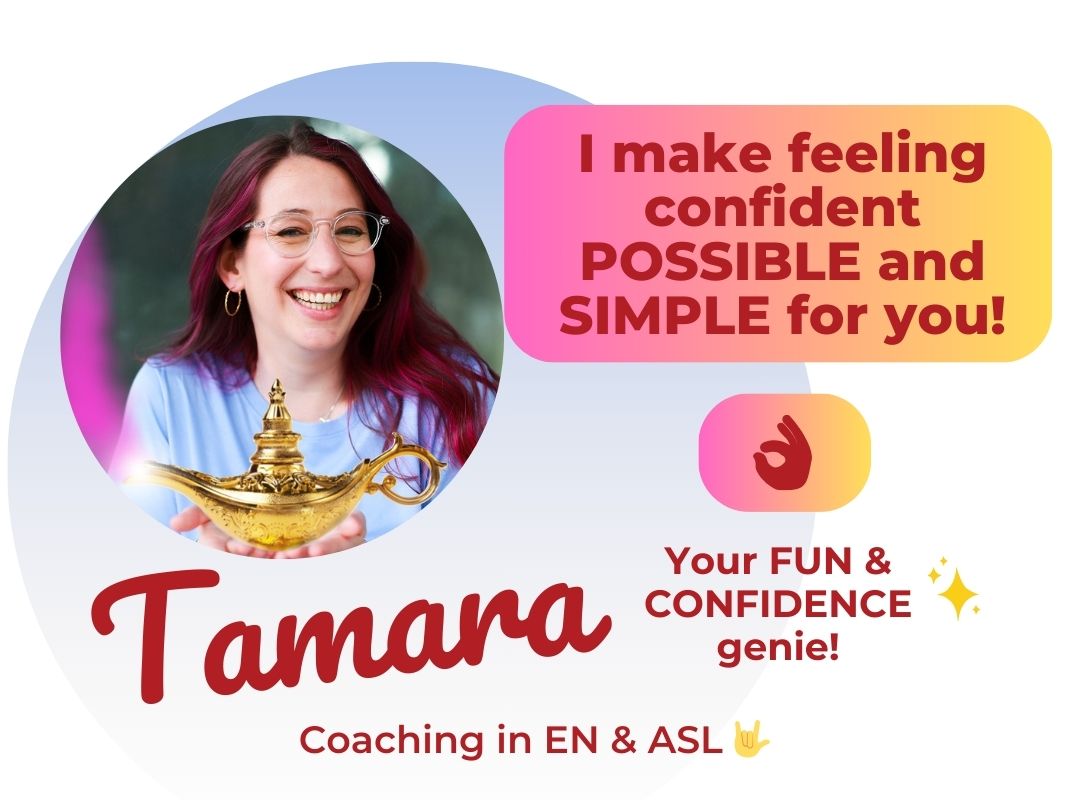
Strengths, talents, and skills, what’s the difference?!
Skills are a bit different from both talents and strengths, but they’re related 🙂
Here’s how they fit in:
Talents
Talents are natural abilities that come easily to you, like being naturally good at drawing or problem-solving!
Skills
Skills are learned abilities that you acquire through practice, training, or experience. You aren’t born with them, but you develop them over time like learning to play an instrument, speak a language, or code!
Strengths
Strengths are when you take a talent or skill and refine it through effort and practice, so you can perform it at a high level consistently!
In short:
- Talent = natural ability!
- Skill = learned ability!
- Strength = well-developed talent or skill!
So, skills are more learned than natural, but they can turn into strengths when practiced enough!
Talent examples! Types of talents!
Here’s a complete list of talents to help you spot your natural gifts!
Recognizing your talents is the first step to turning them into strengths!
And trust me, it feels AMAZING when you know what you’re naturally awesome at!
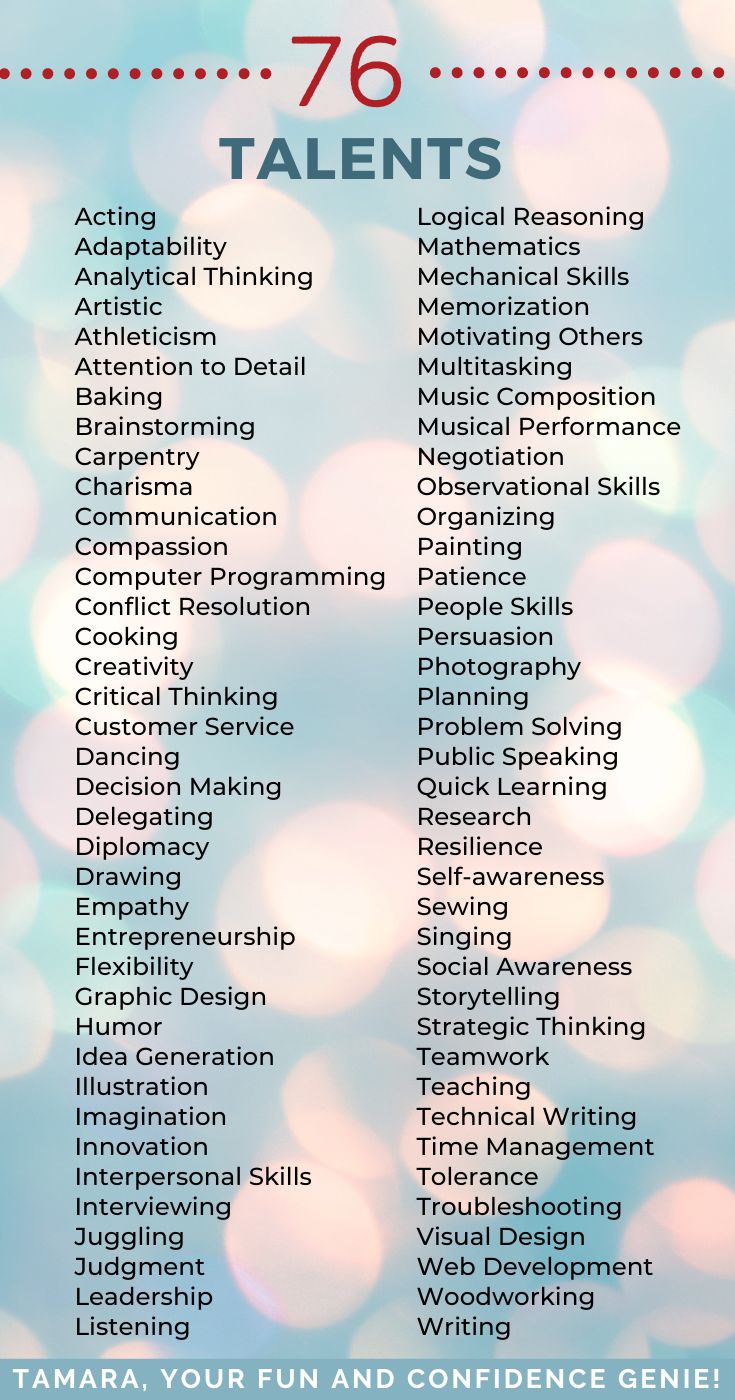
Strengths examples!
Here’s the list of strengths to show what you’re already rocking!
Knowing your expertise helps you build even more confidence and use them to crush your goals!
Because who doesn’t want to level up their superpowers?
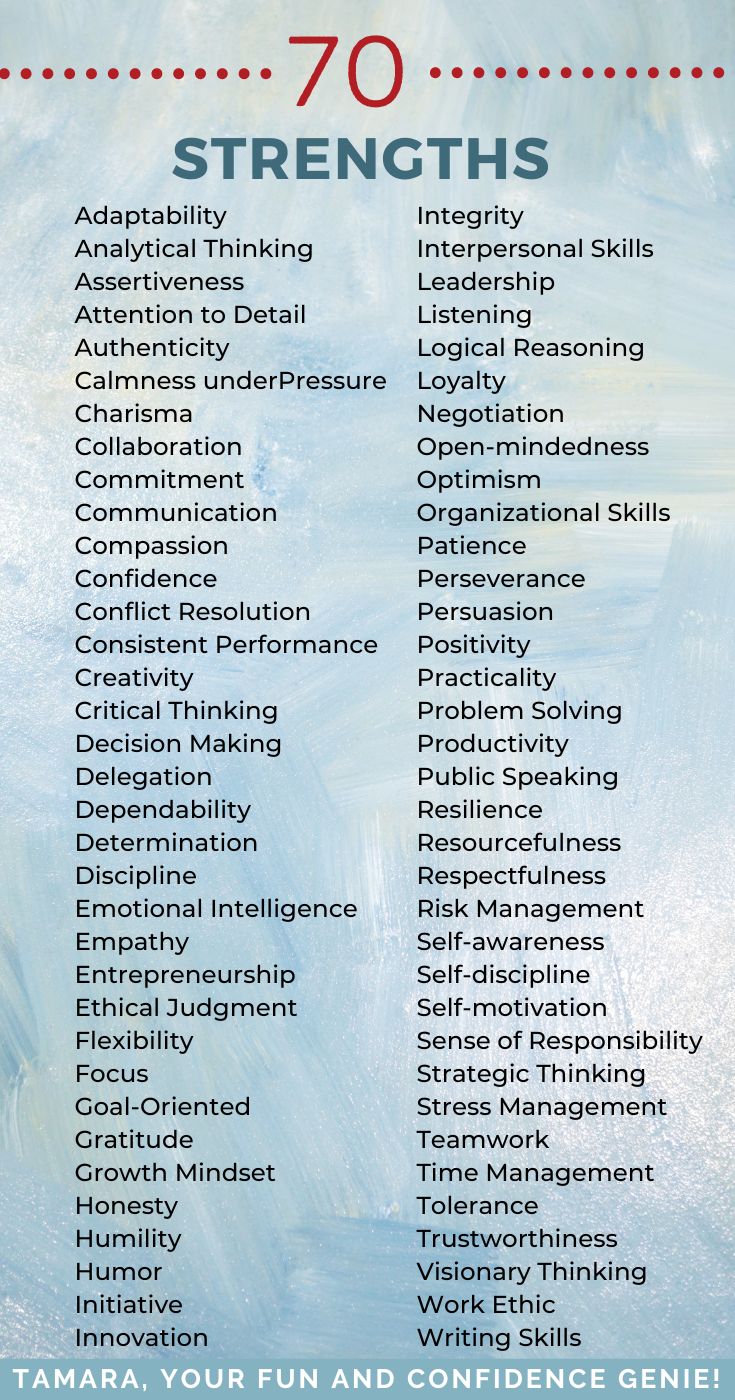
Skills examples!
Here’s a list of skills that you’ve learned and mastered over time !
Knowing your skills helps you see just how much you’ve grown and shows you what you can keep building on to reach new heights!
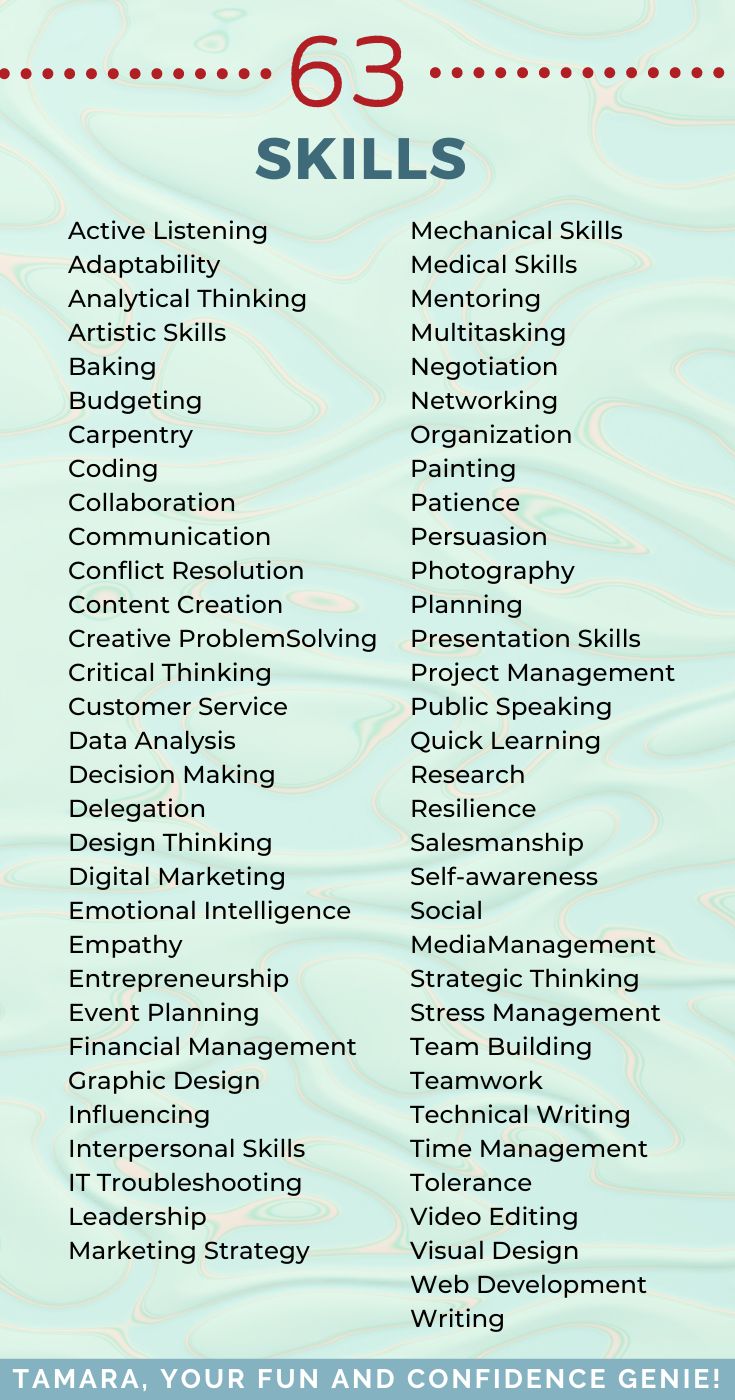
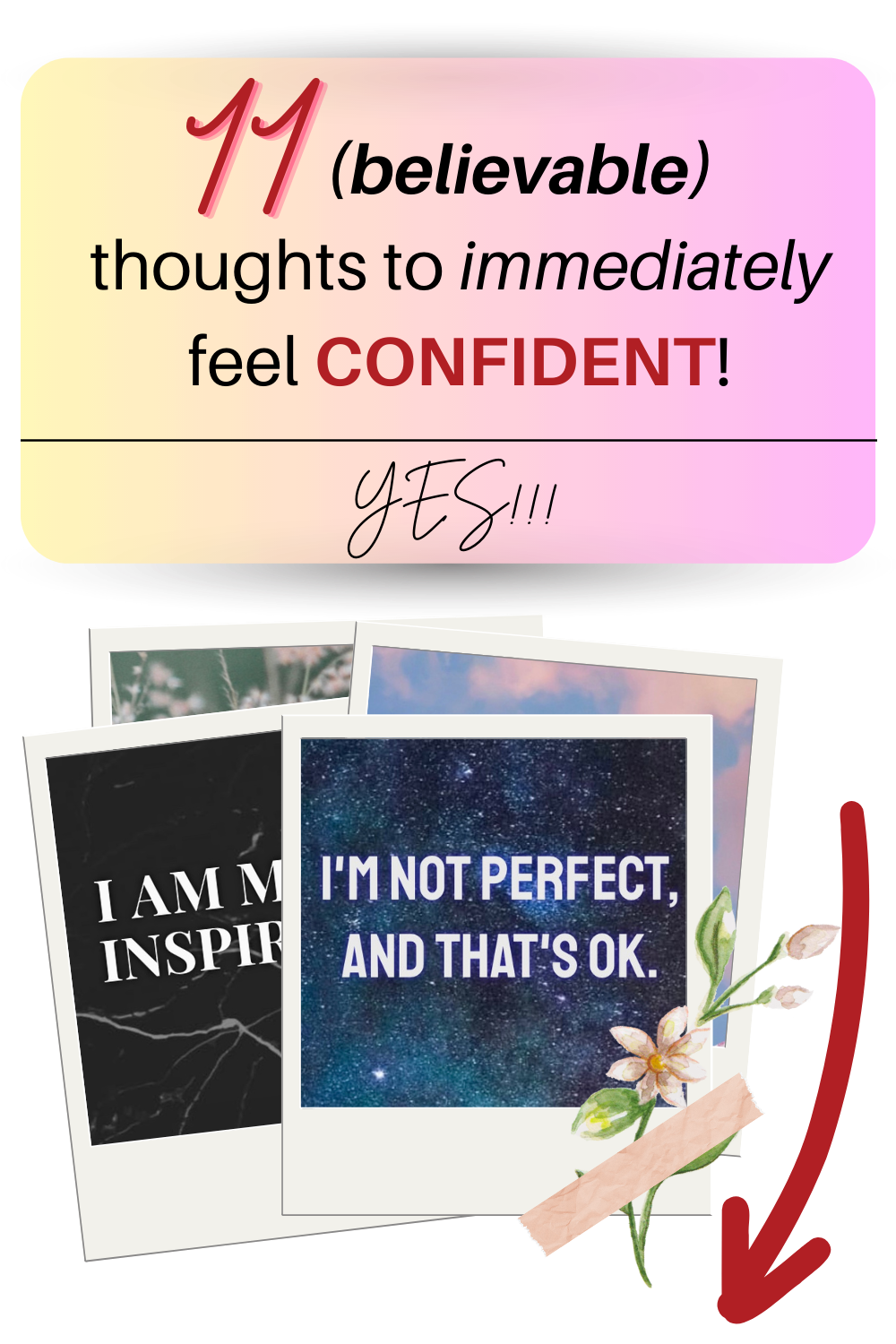
Unique talents! Examples of talents!
What are some rare gifts?!
- Perfect Pitch – The ability to identify or recreate musical notes without any reference!
- Speed Reading – The talent to read and comprehend large amounts of text quickly!
- Memory Mastery – Having an exceptional memory, like remembering entire books or complex sequences.
- Hand-eye Coordination – Exceptional precision and timing, especially in activities like sports or video games.
- Improvisation – The ability to think on your feet and come up with creative solutions or performances spontaneously.
- Storytelling – Crafting compelling narratives that captivate and engage listeners or readers!
- Intuitive Empathy – Deeply understanding and sensing other people’s emotions without them having to say much.
- Photographic Memory – The ability to recall detailed images or information after only seeing it once.
- Multilingual Mastery – Picking up and speaking several languages with ease.
- Talent for Accents – Being able to flawlessly mimic different accents or voices.
- Mind-Body Connection – Exceptional control over your body, like being able to regulate heartbeat or muscle tension through thought alone.
- Creative Visualization – Bringing complex ideas or concepts to life mentally before putting them into action.
- Mechanical Aptitude – A natural understanding of how things work and an ability to fix or build machines easily.
- Pattern Recognition – Spotting trends, connections, or patterns in data, art, or nature that others may miss.
- Speed Calculation – Doing complex mathematical calculations quickly and in your head without tools.
These talents are more rare and specific, making them unique gifts that can be honed into incredible mastery! 🙂
Talent’s characteristics, gifts and talents!
1. FEASIBLE
I always knew how to do this talent.
It’s not something that I learned, I know how to do it from “the beginning”.
Maybe I just discovered it or just developed it, but it was always inside of me.
2. EASY
I can practice this talent easily.
Each time I’m doing it, I’m doing it well and I’m productive at it.
3. DOABLE OVER AND OVER AGAIN and still being A SUCCESS
I can practice this talent over and over again and I will always be good at it.
I’m always or most of the times good at practicing this talent.
I can give more than one example of situations when doing this talent was a success.
4. A PLEASURE TO DO IT
I’m taking pleasure in doing it.
The fact that I’m doing this talent easily is giving me lots of pleasure to do it over and over again.
Maybe I need to make an effort while practicing this talent, but it’s not asking me too much energy.
5. RECOGNIZED AS A TALENT
The people around me know that I’m good at this talent.
For example: “Robert, yes, he’s very empathic, he can easily feel the pain of people”!
People really see this talent in me.
This talent is part of me and is making me unique.
How to guess your talents in 3 questions/situations!
Put yourself in these 3 situations and you will find out what you’re good at.
Again, I used the pronoun “I” so it will be easier for you to picture yourself in these situations.
- When I was a child, what did people use to say about me? For example: “she was the funny one in the classroom” or “he was very responsible and he took good care of…”.
- When I was a child (and able to do whatever I felt like doing), what did I like to do and what did I do most of the time? For example: After school, did I craft at home? Did I write stories? Did I play with friends?
- When I was a child and also now: what am I good at?
You can ask yourself other questions to continue the research, such as:
- Historically, when can I say that I have experienced this talent and in what context? At home? At school?
- Today, how am I using it? In what situations?
- What am I feeling when I’m practicing my talent?
Last step: asking 3 people…
Now, I want you to send this question to 3 people that you love:
“What talents (aptitudes if you prefer!) do you think that I have?”
It will take them 2 minutes to answer and you will see, the result is amazing.
You may be surprised with what they might tell you!
Why don’t we spend more time asking and hearing these things out?!
When I was learning how to coach, I felt uncomfortable asking people these questions.
Now that I think about it, it’s surprisingly powerful to know what our talents are…!
After writing this, I would say that a talent that I have could have is meeting new people.
I really like meeting new people and I feel comfortable doing it.
I hope that I make others feel comfortable as well!
Identify talents, developing talents:
To identify your talents, start by paying attention to the tasks you enjoy and find easy, especially when you solve problems or think in a more analytical way!
Notice where you naturally excel without much effort—this is often a clue to your hidden powers.
Once you recognize these talents, you’ll be able to build on them and turn them into even greater skills! 🙂
List of talent examples, list of talents?
I created a list with all the talents out there 🙂
You can find it by scrolling a bit up!
How to build self-confidence?
Of course and I’m all about self-confidence ;), knowing what you’re good at will help you build your self-confidence!
You realize that you can count on yourself because you have everything already inside of you to do so!
Your masterys and talents are really resources that you can use to get you any result that you want in life!
To sum up!
Discovering your innate talents is an exciting journey! 🙂
Your artistic talents and other hidden talents are innate abilities that come naturally, and exploring them can be a path to personal growth!
The best talent examples often show that a talent can help you unlock your full potential and develop special skills along the way!
With practice, these innate talents can lead to amazing achievements and new opportunities! 🙂
It will be very useful for your personal and professional life, personal and professional success! Life and career too! 🙂 You’ll be able to demonstrate!


